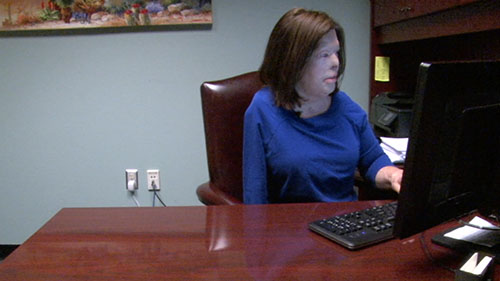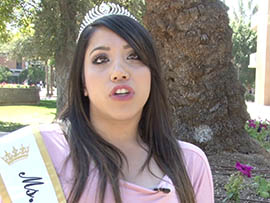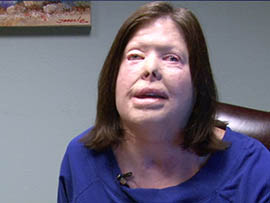Cronkite News has moved to a new home at cronkitenews.azpbs.org. Use this site to search archives from 2011 to May 2015. You can search the new site for current stories.
Lawmaker pushes to replace ‘handicapped,’ ‘disabled’ in state laws
TEMPE – Juliet Martinez has been using a wheelchair since age 8, after she received an overdose of chemotherapy drugs. But she doesn’t consider herself handicapped or disabled.
As Ms. Wheelchair Arizona 2014, Martinez wants to correct misperceptions among those who are able-bodied about what people with disabilities can do. That includes changing the use of “handicapped” and “disabled,” terms that she and others consider limiting.
“Those small words are a huge impact,” she said.
That’s why Martinez supports a state lawmaker’s push to replace those terms in state law with “persons with disabilities” and other conventions using “with disabilities.”
HB 2667, authored by Rep. Stefanie Mach, D-Tucson, also would apply to materials produced by the state such as parking signs and pamphlets.
“It’s antiquated language that we haven’t used in the past several years – I would say decades – as an appropriate way that we refer to people with disabilities,” she said.
Mach, who lost an arm in an accident as a teenager, said changing the terminology in state law would encourage people to see those with disabilities in a different light.
“Just because I do not have an arm doesn’t mean that I don’t see myself as someone who is capable of performing a lot of tasks,” she said.
Mach’s bill received a unanimous endorsement Feb. 19 from the House Health Committee and was headed to the House floor by way of the Rules Committee.
Ann Monahan, chairwoman of the Arizona Association of Providers for People with Disabilities, said that HB 2667 would be a step in the right direction.
“It is important to recognize that any individual with any disability is a person first and foremost,” she said.
Phil Pangrazio, president and CEO of the Arizona Bridge to Independent Living, said that “handicapped” is an outdated and negative term.
“Once in awhile we still hear the ’H’ word and we cringe,” he said.
As for Mach’s bill, Pangrazio said, “It goes a long way to change attitudes about disabilities.”
Martinez, a graduate student at Arizona State University, said that the title of Ms. Wheelchair Arizona is about advocacy and empowerment for those with disabilities. Changing the wording of state laws advances those goals, she said.
“Taking those words out does make it better,” Martinez said.










